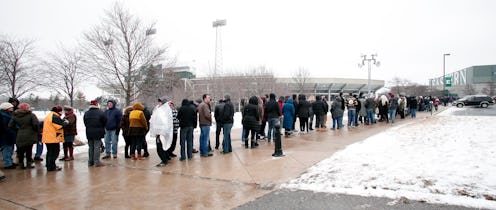News
Who Can Be A Superdelegate?
After the huge dispute over Hillary Clinton's stealing-of-thunder during Bernie Sanders' win in New Hampshire due to her supposed take-home of more delegates, plenty of Americans were uproarious. Such an event may sound unfair at first, but the culpability lies on the institution that is the superdelegate. In any primary or caucus, the ultimate delegate count could potentially work out in such a way that it ends unfairly, but nationally, it simply does not happen that way. Because the goal of each party is to nominate a viable candidate during a party's national convention, superdelegates inevitably reassign their support to the candidate more like to help their party win the White House. So who exactly can become a superdelegate, anyway?
First thing's first: a superdelegate is essentially an unpledged delegate to the Democratic National Convention or the Republican National Convention. A delegate, on the other hand, is a party representative, leader, or elected official who is assigned to a particular candidate within a given party based on vote count. Similar to the selection of delegates, superdelegates are current and former party leaders and elected officials chosen to serve. For instance, a former Democratic governor of a state may act as a superdelegate at the Democratic National Convention. Additionally, some of these superdelegates are chosen during the election season, which differs from a delegate in that delegates are determined during all primaries or caucuses and assigned to a candidate by popular vote.
The term "superdelegate" is, oddly enough, not an official term, but rather a word that popularized over time. By definition, it refers to unpledged delegates seated at a national convention based on their political role. It can also refer to an additional set number of unpledged add-on delegates selected by each state party, who don't necessarily need to hold an office or a spot in any party before becoming superdelegates. They are not made to announce their endorsements for president, though they may do so. They can actually support any candidate within the Democratic Party.
Furthermore, in the Democratic Party, there is a stark contrast between unpledged and pledged superdelegates. Pledged superdelegates are chosen based on their public preference for the presidential nominee, which occurs during caucuses or primaries. They are either congressional district-level pledged delegates, at-large pledged delegates, or pledged PLEO (Party Leaders and Elected Officials) delegates, who are a fixed number of delegates assigned to candidates based on the results of primaries and caucuses. As a result, they're not generally considered superdelegates. Only a few states require superdelegates to support the candidate to whom they are pledged, which means most are able to switch their support as they please. Pledged and unpledged PLEO delegates are not the same in that unpledged PLEO delegates are essentially superdelegates who may vote as they desire.
Republicans, on the other hand, usually have three unpledged superdelegates in each state, and those delegates are often the state chairman and two RNC committee members. They must vote based on the primary elections of their state in order to strengthen the chances for the most attainable presidential candidate to win. Therefore, these superdelegates are essentially regular, old delegates.
Overall, superdelegates do not change the course of an election when voters are so sloped in one direction; they exist to strengthen their party's chances of winning the White House, not divide the chances into fractions of a more potent whole.
